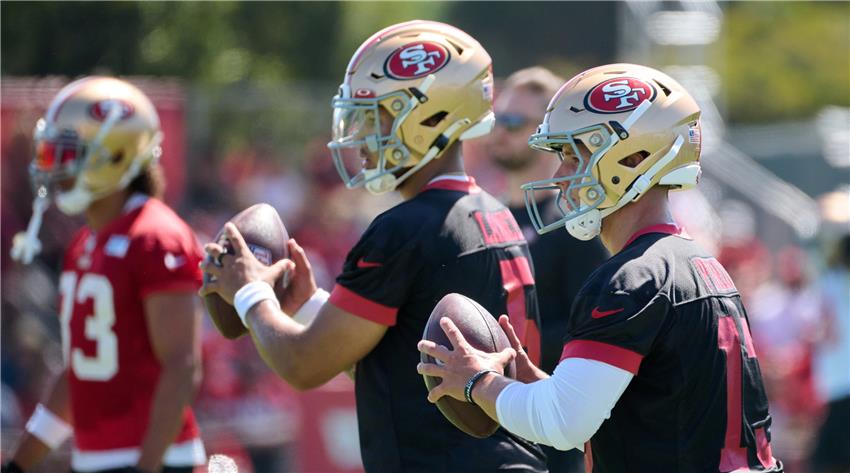
Kickoff Countdown- Inside the NFL Training Camp's Impact on the Season
The sounds of an NFL pre-season training camp—the crack of helmets, coaches' calls, and players' exertions—mark the intense start of the football season. It's a crucial period when rookies taste the rigors of professional football, veterans steel themselves for another challenging season, and coaches begin molding their teams.
As a fan, you might wonder what to focus on amid the flurry of drills, shouts, and team meetings. Training camp, though it varies slightly from team to team, generally follows a consistent pattern of rigorous training, strategy sessions, and player evaluations. This is where the strategies for the upcoming season are first laid out, playbooks are digested, and team chemistry begins to form.
It's a relentless routine that shapes teams, grooms rookies, and tests veterans. As we delve into the intricacies of training camp, we'll explore its significance for rookies, veterans, and the overall team dynamics for the forthcoming season.
Rookies on the Rise: How NFL Training Camp Shapes New Talent
Stepping onto the field for their first NFL training camp is a moment rookies often dream about, but the reality is a grueling test of mental and physical mettle. It's a leap from college football into the professional arena, and rookies have to make this transition swiftly and effectively.
Training camp is the rookies' proving ground. It's their chance to show coaches, teammates, and sometimes even themselves, that they belong in the NFL. They must adjust to the speed and complexity of the professional game, which is often a significant step up from college football. Every drill, every snap is an opportunity to impress, but also a challenge to overcome.
Learning the playbook is another crucial aspect of training camp for rookies. NFL playbooks are famously intricate, filled with hundreds of plays, each with its own variations and audibles. Understanding the playbook is not just about memorizing the plays; it's about comprehending the underlying strategies and being able to make the right decisions under pressure.
Building chemistry with teammates is also vital. For a rookie, this means learning to sync with the team's rhythm, understanding the playing styles of their teammates, and earning their trust. This is particularly important for positions that rely heavily on coordination with other players, such as quarterbacks, wide receivers, and offensive linemen.
But perhaps the most daunting aspect of training camp for rookies is the competition. They're vying for a spot on the team, often against more experienced players. Standout performances in training camp can elevate a rookie from a benchwarmer to a starter, or even secure their place on the team.
Remember Russell Wilson's rookie training camp with the Seattle Seahawks in 2012? Despite being a third-round draft pick and initially expected to be a backup, Wilson impressed in training camp and preseason games. His performances earned him the starting quarterback job over the more experienced Matt Flynn, and he's held onto that role ever since.
Seasoned Pros: The Importance of Training Camp for NFL Veterans
For the seasoned veterans, training camp offers a different set of challenges and opportunities. They're no longer the wide-eyed rookies trying to find their footing; they're the established pros, the leaders of the locker room. But even for them, training camp is far from a walk in the park.
One of the key aspects of training camp for veterans is competition. While they may have secured their spot on the team, there's always a younger player looking to prove himself, to claim a starting position. Veterans need to keep honing their skills, maintain their physical condition, and show their value every day.
Take the case of Drew Brees, the long-time starting quarterback for the New Orleans Saints. In the 2018 training camp, despite having already secured his starting position, Brees was known for his relentless work ethic. He consistently stayed late after practice to work on his throws, study plays, and mentor younger players. This dedication not only kept him at the top of his game but also fostered a culture of hard work and commitment within the team.
For many veterans, training camp is also a time to mentor the younger players. They pass on their knowledge, help rookies adjust to the NFL, and set the tone for the team's work ethic and culture. Ray Lewis, the legendary linebacker for the Baltimore Ravens, was known for his leadership in training camp, pushing his teammates to improve and setting a high standard of performance.
But training camp isn't just about physical preparation; it's also about strategic understanding. Teams often implement new plays or adjust their strategies during training camp, and veterans must quickly adapt to these changes. Peyton Manning, one of the greatest quarterbacks in NFL history, was famous for his deep understanding of the game. Every training camp, he would master the playbook and often suggest adjustments, becoming an extension of the coaching staff on the field.
Injuries are another crucial aspect of training camp for veterans. Players returning from injuries use training camp to regain their fitness and reintegrate into the team. Take the example of Rob Gronkowski, the star tight end for the Tampa Bay Buccaneers. After coming out of retirement for the 2020 season, training camp was vital for Gronkowski to regain his match fitness and reestablish his connection with quarterback Tom Brady.
Battle Lines: Unpacking Position Fights and Performance Metrics in NFL Training Camp
Training camp is often the stage for some of the most intense battles in football, and we're not talking about scrimmages. Position battles, the competition for starting roles and roster spots, are a key aspect of every training camp.
Every snap, every drill is an opportunity for players to prove themselves to the coaches and their teammates. Some battles are between rookies trying to earn their place, others between veterans fighting to keep their starting roles. These competitions can be some of the most dramatic and intriguing parts of training camp.
Take the famous 2008 training camp battle between Brett Favre and Aaron Rodgers for the Green Bay Packers' starting quarterback position. Favre, a veteran and long-time starter, was considering retirement, while Rodgers, a young talent, was eager for his shot at the starting job. The competition was fierce, ultimately leading to Favre's departure and Rodgers taking the reins.
But how do coaches evaluate these performances? Beyond the obvious physical performance, they look at understanding of the playbook, decision-making under pressure, leadership, and teamwork. It's not just about who's the fastest or strongest; it's about who can best contribute to the team's success.
Injury management is also a significant part of performance evaluations. Coaches must balance the need to prepare players for the season with the risk of injury. This is especially true for key players or those returning from injuries. For instance, in the 2012 Washington Redskins training camp, a lot of attention was on the recovery of their star quarterback, Robert Griffin III, from a severe knee injury. The team had to carefully manage his training to ensure he was ready for the season without risking re-injury.
The Final Whistle: From Training Camp Cuts to Regular Season Predictions
As the summer heat gives way to the cooler breeze of fall, so too does training camp wind down, culminating in the final roster cuts. This is a nerve-wracking time for players on the bubble, as teams trim their rosters to the regular season limit.
Decisions on who makes the cut are based on a mix of training camp performance, positional needs, and sometimes, unfortunately, salary cap considerations. Coaches and general managers must weigh the potential of rookies against the experience of veterans, the promise of talent against the reality of injuries.
One memorable example was the 2010 HBO series "Hard Knocks," which followed the New York Jets through their training camp. The show offered an inside look at the tough decisions coaches had to make, like the emotional release of popular fullback Danny Woodhead, who would later go on to have a successful career with the New England Patriots.
Once the dust settles and the final roster is set, teams can look ahead to the regular season. Training camp performances can often be indicative of regular-season success. A strong showing can build momentum and confidence heading into the season, while a lackluster camp might set off alarm bells.
Consider the 2007 New York Giants, who had a rough training camp marked by injuries and uninspiring play. However, they managed to turn their fortunes around during the regular season and went on to win the Super Bowl in one of the biggest upsets in NFL history.
On the other hand, the 2001 "Dream Team" Philadelphia Eagles had a promising training camp with a star-studded roster. Yet, they failed to translate that into regular-season success, showing that training camp is not always a perfect predictor of what's to come.
NFL training camps are a vital part of the football season. They're a time of intense competition, learning, and preparation, where rookies and veterans alike strive to prove their worth. As fans, understanding the dynamics of training camp can provide a deeper appreciation of the game and make the anticipation of the upcoming season even more exciting.
